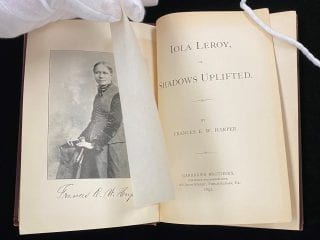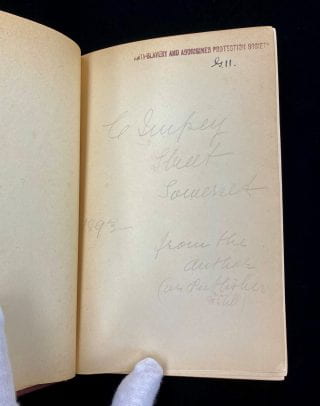In celebration of the milestone of the University Libraries’ three millionth volume, Special Collections has added a very important rare book, a unique copy of Frances Ellen Watkins Harper’s Iola Leroy, or, Shadows Uplifted. One of the extraordinarily rare 1892 first printings of the groundbreaking novel, this inscribed gift copy from the renowned African American orator, activist, and poet also includes an important ex libris stamp from the Anti-Slavery and Aborigines Protection Society.

One of the earliest novels published by an African American woman, Iola Leroy tells the story of a daughter of a Black mother and slave-holder father who pursued professional and organizational means to improve the lives of the formerly enslaved while choosing her own path in relationships and self-identification.
This copy of Iola Leroy has great significance regarding black liberation and abolitionism, women authors, and African American culture. This copy was given by Harper to Catherine Impey, an English abolitionist and racial justice activist.
Catherine Impey was the founder of Anti-Caste, the first aboriginal and racial rights journal in Great Britain. Impey also formed the Society for the Recognition of the Universal Brotherhood of Man with American Ida B. Wells-Barnett, the pioneering anti-lynching activist instrumental in drawing attention to racial violence in Arkansas and across the American South. Today known as Anti-Slavery International, the Anti-Slavery and Aborigine Protection Society that once held this copy is the oldest international human rights organization in the world.

Harper was a celebrated public speaker and prolific poet who used her rhetorical power to advance the cause of greater social and economic opportunity for African Americans, touring and publishing widely for nearly 50 years. The novel addresses issue of women’s identity and independence, the complexity of race, and the precariousness of liberty for people of color. Of only a few first editions of Iola Leroy in academic libraries, this is likely the only signed copy.
Some other related and impactful rare books available in Special Collections
Stowe, Harriet Beecher, Hammatt Billings, and William Jay Baker. Uncle Tom’s Cabin; or, Life Among the Lowly. Boston: John P. Jewett & company; Cleveland: Jewett, Proctor & Worthington, 1852. First edition of the highly impactful and influential novel that contributed to the movement toward civil war and emancipation for enslaved African Americans in the United States.
Stanton, Elizabeth Cady. Eighty Years and More (1815-1897): Reminiscences of Elizabeth Cady Stanton. New York: European Pub. Co., 1898. This is the personal copy of the Stanton’s autobiography once owned by her dear friend and colleague, leading suffragist Susan. B. Anthony. Along with her address and signature, Anthony directs those who use the book: “This book is to loan and let everyone be sure and return it promptly.” It was acquired by University of Arkansas alumna, librarian and archivist Mary Dengler Hudgins before being donated to Special Collections.
Dunbar, Paul Laurence. Lyrics of the Hearthside. New York: Dodd, Mead and Company, 1899. A contemporary of Harper, Laurence Dunbar enjoyed great success as an innovative poet before his untimely death. This first edition of his Lyrics of the Hearthside includes the poem “Sympathy” with line that famously inspired Maya Angelou, “I know why the caged bird sings.”
Douglass, Frederick, and William Lloyd Garrison. Narrative of the Life of Frederick Douglass, an American Slave. Boston: Pub. at the Anti-slavery Office, 1849. Like Harper, Douglass was a powerful orator and prolific writer who traveled the nation, including the former slave states of the Confederacy, to advocate for greater rights for African Americans and women. First published in 1845, Douglass’s Narrative of the Life was a significant and widely read treatise on abolition that became the most widely recognized example of a “slave narrative,” an important genre of 19th century publication as the United States and other nations grappled with the legal and ethical crisis of enslavement.
Angelou, Maya. I Know Why the Caged Bird Sings. New York: Random House, 1969. First edition of the watershed memoir by celebrated poet, Maya Angelou. The book details the trauma Angelou suffered as a child when living in Stamps, Arkansas, and gives voice to the learning and power of Black women and intellectuals through an innovative reworking of the memoir, and remained a bestseller for years afterward.
Further Reading:
Stancliff, Michael. Frances Ellen Watkins Harper: African American Reform Rhetoric and the Rise of a Modern Nation State. 2014. https://library.uark.edu/record=b5147652~S4.
Fagan, Benjamin. African American Literature in Transition, 1830-1850. Cambridge, United Kingdom ; New York, NY : Cambridge University Press, 2021. https://library.uark.edu/record=b6190594~S4.
Sandler, Matt. The Black Romantic Revolution: Abolitionist Poets at the End of Slavery. London; New York: Verso Books, 2020. https://library.uark.edu/record=b6191406~S4.
